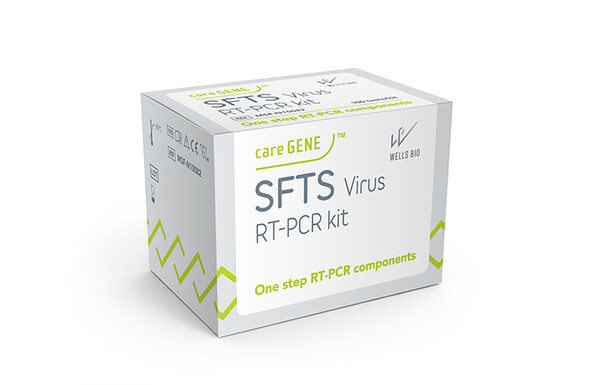Wells Bio said on Wednesday that its careGENE SFTS Virus RT-PCR kit obtained domestic approval to diagnose severe fever with thrombocytopenia syndrome (SFTS) virus.

The kit diagnoses the genes of the SFTS virus in human blood samples with real-time reverse transcription polymerase chain reaction (RT-PCR).
The company said the product showed “100 percent” sensitivity and specificity as a result of clinical trials conducted in Korea, proving excellent clinical performance, and improving the accuracy and efficiency of diagnostic tests. Additionally, it can detect 25 copies per reaction which means it can detect the virus if only 25 RNA copies exist in the sample.
SFTS is a new infectious disease that first occurred in China in 2009 and the cause was identified in 2011. It is a third-class legal infectious disease spread by two species of ticks carrying the SFTS virus. After the onset, a decrease in platelets is observed during the patient's blood test, and a decrease in white blood cells or an increase in liver enzyme level is also accompanied.
The main symptoms include fever and digestive symptoms such as lack of appetite, abdominal pain, nausea, vomiting, and diarrhea.
SFTS is usually suspected if the patient is engaged in outdoor activity from April to October, and possesses continuous high fever and digestive symptoms, with platelet reduction.
Vector-borne ticks are mainly active from May to August, and domestic cases are mainly reported from June to October. The highest cases usually occur in October. Grave cleaning and weeding during the national Chuseok holiday in the autumn are suspected to spread the virus.
A total of 1,334 SFTS patients in Korea were reported between 2013 and 2020, and since 2017, about 200 to 250 patients have been continuously occurring annually. Reported cases are mainly reported in Korea, China, Japan, and other parts of Southeast Asia.
"The abnormal findings of patients with SFTS can be observed in other diseases, so it is very difficult to diagnose,” said an official from Wells Bio. “Currently, there are no SFTS vaccines or antivirals but our diagnostic reagent is expected to greatly contribute to the domestic quarantine to help prevent the disease spread."

